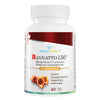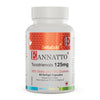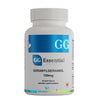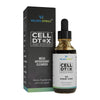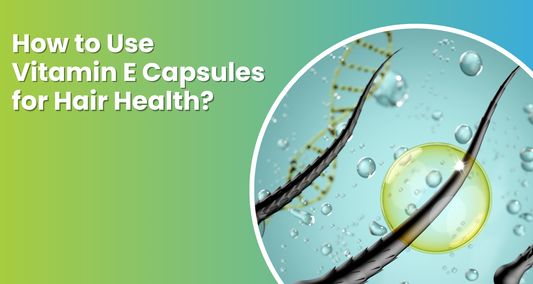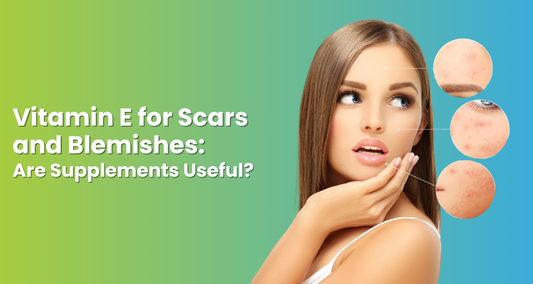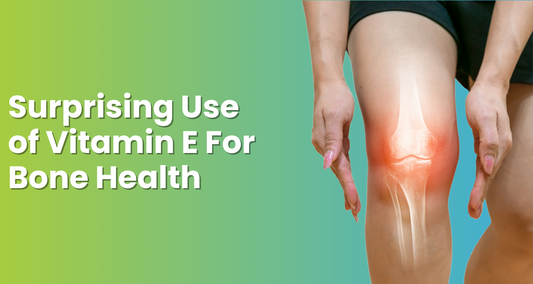Modern lifestyle takes a heavy toll on the liver. Fried food, alcohol, and prescription drugs are the most common damaging substances that affect the health of the liver. Therefore, it becomes increasingly essential to have a potent antioxidant, like Vitamin E, as your ally to counteract the free radical damage caused by these stressors.
In this blog, we’ll discuss the optimal dosage of Vitamin E and how much Vitamin E is good for your liver health.
Vitamin E for Fatty Liver: First, what is Vitamin E?
Vitamin E is a group of fat-soluble compounds with potent antioxidant abilities. It exists in 8 isoforms (alpha-, beta-, gamma-, and delta-tocopherol and alpha-, beta-, gamma-, and delta-tocotrienol), each with different levels of bioavailability in the body.
Interestingly, Tocotrienols are the newly discovered form of this master antioxidant. They are more advanced, compared to tocopherols and are much more readily bioavailable form of vitamin E.
Before we discuss the ideal dosage of Vitamin E for fatty liver, let’s understand fatty liver disease and its types.

Fatty Liver – How it Happens?
In general, the role of the liver is fat assimilation, and it does contain some fat. But if overall fat content is more than 10% of the liver’s weight, you may have a fatty liver.
Fatty liver disease is the build-up of excess fat in the liver cells. It is a widespread complaint in Western countries, affecting about 1 in every ten people.
Types of Fatty Liver Disease:
Fatty liver disease is classified into two main types:
1. Non-Alcoholic Fatty Liver Disease (NAFLD):

It is the most common type of fatty liver disease in the US. It affects one in three adults. Unlike the other main types, it doesn’t result from drinking alcohol. It has two forms: Simple Fatty Liver and Nonalcoholic Steatohepatitis (NASH).
Simple Fatty Liver disease means that you have fat in your liver but no inflammation. It usually doesn’t lead to any issues. Most people with fatty liver disease have this type.
On the contrary, Nonalcoholic Steatohepatitis (NASH) is the severe form of NAFLD. In this case, there is inflammation in your liver and liver cell damage that may cause serious health concerns such as cirrhosis.
Also read: The Comprehensive Guide on What Is Vitamin E Good For?
2. Alcohol-related fatty liver disease (ALD):

It is a less common type, affecting about 5% of the U.S. population, and is caused by overconsumption of alcohol. This type of fatty liver disease usually gets better when you stop drinking alcohol. However, if you keep drinking, ALD can cause serious problems, including:
- Enlarged liver
- Alcoholic hepatitis
- Alcoholic cirrhosis
- Liver failure, which can be fatal
Vitamin E for Fatty Liver: General Vitamin E Dosage for Liver Health

Finally, let’s answer the question: how much vitamin E is good for your liver? Vitamin E and fatty liver conditions can be linked. To keep liver-related problems at bay, it is essential to maintain the recommended dietary allowance (RDA) of vitamin E dosage that should be consumed daily.
For adults, the Recommended Dietary Allowance (RDA) for Vitamin E is about 15 milligrams (mg) of tocopherol daily. However, when it comes to liver health, particularly in the management of conditions like NAFLD and NASH, the dosages used in studies are often much higher.
As per the available literature, Tocotrienols, the pure form of Vitamin E, offers potential liver health benefits at doses ranging from 100 to 300 milligrams per day. The antioxidant properties of Vitamin E for liver may help reduce oxidative stress and inflammation, potentially slowing the progression of liver damage in NAFLD and NASH.
Vitamin E and Fatty Liver: Recommended Tocotrienol Vitamin E dosage
As per Dr. Barrie Tan, the foremost Vitamin E expert, you can take up to 250 mg of Tocotrienols Vitamin dosage daily for high lipids. For NAFLD “Fatty Liver,” the ideal recommended dosage could be up to 600 mg.
Note that the ideal Vitamin E dosage may vary based on individual factors, including age, gender, diet, and other health conditions.
Also read: Vitamin E Types – From Tocopherols to Most Potent Tocotrienols
What is the First Sign of Fatty Liver Disease?
If you follow an excessive oily diet or regularly consume alcohol, then you're at risk. Being overweight or leading a sedentary lifestyle can also increase your risk. However, liver testing is necessary to determine whether your liver enzymes, such as alanine transaminase (ALT) and aspartate transaminase (AST), are high.
Unfortunately, even with testing, your liver enzyme levels can remain normal until inflammation has progressed. This may not even happen even after cirrhosis has set in, as the liver is hard. Therefore, changing your lifestyle to support your liver is best, especially if you have known risk factors.
Also read: Vitamin E - Why Tocopherol Fails?
Signs and Symptoms
It is difficult to detect liver-related disorders at an early stage. Most people do not know they have a liver health-associated problem unless something is diagnosed. However, the most common signs and symptoms of liver disease may include the following:
- Itchy skin
- Dark urine
- Chronic fatigue
- Loss of appetite
- Pain in abdomen
- Swelling in abdomen
- Nausea and vomiting
- Tendency to bruise easily
- Yellowing of eyes and skin
Considerations and Cautions with Vitamin E Dosage
High Vitamin E dosage may have side effects. It may interact with medications. It's essential to discuss with a healthcare provider before starting any new supplementation, especially for individuals on blood thinners or those with a history of certain medical conditions.
Also read: Vitamin E Unit: Why are Tocotrienols in Mg and Tocopherols in IU?
Final Words
While Vitamin E shows promise for supporting liver health, particularly in the context of NAFLD and NASH, the ideal dosage can vary widely based on individual needs and the specifics of the liver condition.
It is crucial to consult with a healthcare professional before starting supplementation of Vitamin E for liver health to determine the appropriate dosage and to ensure it is safe based on your overall health and any other medications or supplements you may be taking.
Disclaimer: These statements have not been evaluated by the FDA. The information contained within this page is for educational purposes only. It is not intended to replace the advice or attention of health care professionals.
